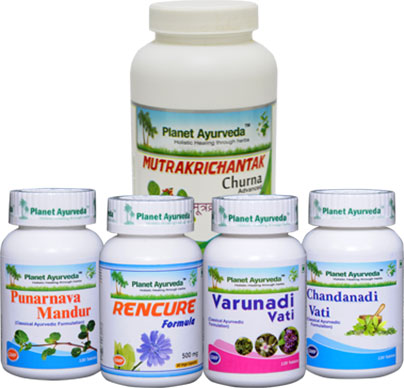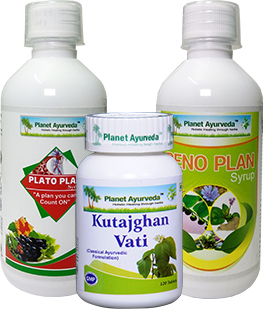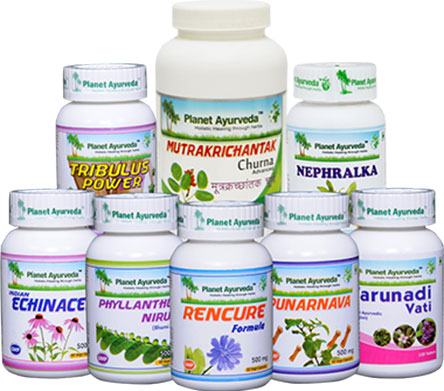Natural Cure For Hemolytic Uremic Syndrome

ABSTRACT
In this article our main topic of discussion is hemolytic uremic syndrome. As this disease is characterized by involvement of multiple systems of our body with the presence of various complaints. Early identification and beginning of the best supportive treatment protocol as early as possible might result in favorable outcomes in most of the patients. So let’s start putting some rays of limelight on this topic.

INTRODUCTION
Hemolytic uremic syndrome is a combination of blood disorders in which there is presence of low red blood cell and platelets count associated with acute renal failure. In this condition the small blood vessels of kidneys become inflamed and damaged. Due to the formation of inflammation in blood vessels it will block the filtration of blood inside kidneys that leads to a life threatening situation such as kidney failure.
As per ayurveda hemolytic uremic syndrome comes under “rakta pitta in mutra vaha srotas” (channels involving urinary system with presence of hemolytic disorders.)
COMMON CAUSES
These are the main causes (nidan as per ayurveda) that results in formation of an ailment.
- Most common cause of HUS is the presence of infection in the alimentary tract and in most of the cases it is due to E.coli infection.
- Persistent diarrhea
- Infection of upper respiratory tract.
- Underlying autoimmune disorders
- Due to certain genetic mutations
- Use of carcinogenic medications in excess amounts.
- Presence of infectious disease:
- HIV (human immunodeficiency virus)
- Influenza
- Pneumonia
- Intake of immunosuppressant medications.
As per ayurveda main causes of hemolytic uremic syndrome, that lead to formation of a pathology in mutravaha srotas are explained in the below mentioned verse.
![]()
(Charaka. Viman 5/20)
- When a person do consumption of water, food and coitus during natural urge of micturition (urination)
- Suppress his/her urge of micturition deliberately for a longer period of time.
- When a person is lean & thin.
- Due to external injury to the body.
CLINICAL FEATURES:
It includes the signs and symptoms. A symptom means the general complaints along with which patients present in front of the physician. Signs: It means what a physician notices himself by observing the patient’s condition.
The signs and symptoms of hemolytic uremic syndrome may vary from mild to severe ones.
- Hematuria (presence of blood in urine)
- Presence of abdominal pain
- Bloating
- Vomiting
- Lethargy
- Fever
- Persistent diarrhea that might contain blood
- Oliguria (decreased urination)
- Pallor
- Edema over dependent parts of the body such as ankle, extremities etc.
- Muscle cramps and body ache.
- Weakness.
- Weight loss
- Pain in lower back.
- Urine looks abnormal in color and has a frothy/foamy appearance.
- Sleep cycle disturbance.
- Swelling under the eye area.
According to Ayurveda

This verse explains that- Mutravaha srotas (urine forming channels) have their main seat in ‘basti’ (urinary bladder) and ‘vankshan’. Common complaints patient feel are as follow:
- Ati sarishtam ati vibadham (over excretion or complete obstruction of urine)
- Prakupitam alpam alpam bhikshnam (formed urine will be vitiated and diminished in amount)
- Bahlam sashulam (thick urine with ache)
Risk factors:
It includes the factors responsible for increasing the chance of developing an ailment in the body.
- This disease is seen more prominently in children below 5 years of age and in adults over 65 years of age.
- Hypertension
- Epilepsy
- Cardiovascular ailments
- Coma
- Chronic renal diseases
- Cardiac arrest
DIAGNOSIS
It means how we can identify the disease. There are various methods:
- General physical examination of patients by using inspection techniques.
- Proper history taking.
- Laboratory findings. It Includes:
- Complete blood count test.
- Glomerular filtration rate (GFR) test.
- Renal function test
Reference Units Blood urea nitrogen(BUN) 5-25 mg/dl Creatinine 0.3-1.4 mg/dl Uric acid 2.5-7.0 mg/dl
MANAGEMENT
Treatment in modern system of medicine:
Supportive care:
- Antihypertensive Medications.
- Maintaining proper level of fluid and electrolyte therapy
- Blood Transfusions
- In advance cases- kidney dialysis is recommended.
As these above mentioned treatment modalities will just give a symptomatic relief to the patient. So we need to use ayurveda as it is an ancient most healing system which was originated in India over thousands of years ago that focuses on maintaining a balance between the body and mind by considering the “tridoshas theory” (3 most important energies in the body- vata, pitta & kapha) or “panchamahabhuta theory” (5 essential component for life) — akash (sky), vayu (air), agni (fire), jal (water), prithvi (earth)
Ayurvedic treatment
Ayurveda offers various herbal & natural formulations that will help you in preventing complications of hemolytic uremic syndrome as it believes in going on to the root level of disease. It focuses on doing prakriti analysis of each and every patient, and then uses those medications that will suit the individual prakriti.
- Our acharya explains certain best dravyas known as “Agray dravya”
- To treat retention of urine (mutra krich) and vitiated vata dosha
- Gokshur (Tribulus terrestris) is the best herbal drug mentioned in our text.
Herbal remedies for Hemolytic Uremic Syndrome by planet ayurveda
Planet Ayurveda is a leading herbal manufacturing unit serving mankind with their 100% organic products free from preservatives and chemical agents, made under the supervision of ayurveda experts. They offer various herbal formulations to be used in hemolytic uremic syndrome. Some of them are as follows:
Revive kidney Pack
This pack contains 4 herbal formulations they are as follow:
- Mutrakrichantak Churna
- Punarnava Mandur
- Varunadi Vati
- Rencure Formula
- Chandanadi vati

PRODUCTS DESCRIPTION
1. Mutrakrichantak Churna
This powdered form herbal formulation contains herbs like gokshur (Tribulus terrestris), bhumi Amla (Phyllanthus niruri), varun (Crataeva nurvala) etc. Herbs present in this churan works on balancing tridosha (elevated energies), thus they are very good in maintaining healthy renal functioning and assist very profoundly in prevention of deterioration of hemolytic uremic syndrome.
Dosage: 1 Teaspoonful twice daily with plain water.
2. Punarnava Mandur
This herbal formulations contain various indian herbs such as punarnava (Boerhaavia diffusa), pippali (Piper longum), maricha (Piper nigrum), amalaki (Emblica officinalis), mandoor bhasma (Ferric oxide calx) etc. This formulation is very effective in managing digestion related issues which a patient of hemolytic uremic syndrome generally complaints about.
Dosage: 1 tablet two times a day with lukewarm water.
3. Varunadi Vati
This herbal formulation contains various herbs such as guggul (Commiphora mukul), gokshura (Tribulus terrestris), varun (Crataeva nurvala), punarnava (Boerhavia diffusa) etc. It helps in relieving pain, keeps kidney functioning healthy and regular. So it is a great choice in patients suffering from hemolytic uremic syndrome (HUS)
Dosage: 2 Tablets, thrice daily with plain water after meals.
4. Rencure Formula
This herbal formulation contains potent herbs like punarnava (Boerhavia diffusa), varun (Crataeva nurvala), palaash (Butea monosperma), kasni (Cichorium intybus), etc. These herbs are tridoshahar (help to relieve tridosha imbalance) as they have madhur (sweet), tikta (bitter) and kashaya (astringent) taste that reduce pitta dosha. Also these herbs are ushan (hot potency) in property so helps in decreasing kapha-vata doshas. So this herbal formula has very efficacious results in patients suffering from hemolytic uremic syndrome.
Dosage: 2 Capsules twice daily with plain water after meals.
Beside revive kidney care pack; some other useful herbal formulations in hemolytic uremic syndrome are as follow:
- Plato Plan Syrup
- Kutajghan Vati
- Reno Plan Syrup
1. Plato Plan Syrup
This herbal formulation contains herbs such as eranda karkati (Carica papaya), giloy (tinospora cordifolia), ashwagandha (Withania somnifera), amalaki (Embilica officinalis), draksha (Vitis vinifera) etc. All the herbs present in this are enriched with immuno modulatory action, thus assisting in elevation of the immunity power of the body. It also helps in raising the platelet count due to its integral properties.
Dosage: 2 teaspoons twice daily.
2. Kutajghan Vati
This herbal formulation contains pure and standardized extract of kutaj (Holarrhena antidysenterica). This herb is a natural anti-diarrheal drug mentioned in our classical texts. As the patient of hemolytic uremic syndrome suffers from the problem of persistent diarrhea this herbal formulation works very generously in combating this symptom of hemolytic uremic syndrome.
Dosage: 2 tablets twice daily with plain water after meals.
3. Reno Plan Syrup
This herbal syrup contains punarnava (Boerhavia diffusa), bhumi amla (Phyllanthus niruri), gokshura (Tribulus terrestris), varuna (Crataeva nurvala), root extract of kash (Saccharum spontaneum), root extract of ikshu (Saccharum officinarum) etc. Herbs present in this work as a very good diuretic and clears out all the impurities present in the renal system of our body helps in dealing with symptoms of oliguria or hematuria which a patient of hemolytic uremic syndrome usually suffers.
Dosage: 1 teaspoon two times daily after meal.
CONCLUSION
Now we can conclude that with Ayurvedic herbs we can surely prevent the complication of hemolytic uremic syndrome very efficiently, if we consume herbal formulation in adequate amounts as guided by a physician along with proper dietary regime. So you can choose planet ayurveda for the ayurvedic treatment. It is a leading manufacturing unit serving mankind by using principles of ayurveda. In case of any query kindly visit www.PlanetAyurveda.com





